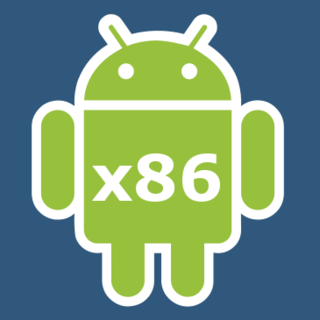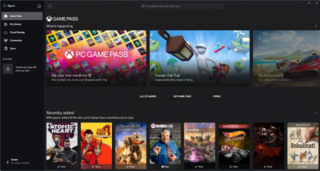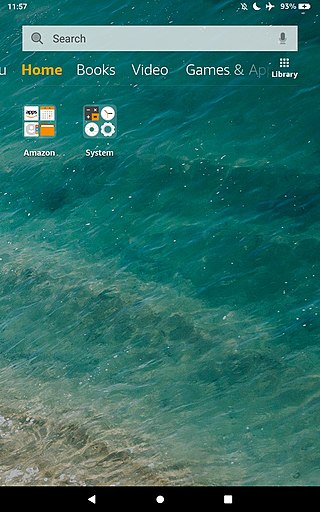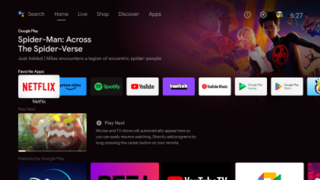Parallels is a software company based in Bellevue, Washington; it is primarily involved in the development of virtualization software for macOS. The company has offices in 14 countries, including the United States, Germany, United Kingdom, France, Japan, China, Spain, Russia, Australia and Mauritius and has over 800 employees.

A tablet computer, commonly shortened to tablet, is a mobile device, typically with a mobile operating system and touchscreen display processing circuitry, and a rechargeable battery in a single, thin and flat package. Tablets, being computers, do what other personal computers do, but lack some input/output (I/O) abilities that others have. Modern tablets largely resemble modern smartphones, the only differences being that tablets are relatively larger than smartphones, with screens 7 inches (18 cm) or larger, measured diagonally, and may not support access to a cellular network. Unlike laptops, tablets usually run mobile operating systems, alongside smartphones.

Android is a mobile operating system based on a modified version of the Linux kernel and other open-source software, designed primarily for touchscreen mobile devices such as smartphones and tablets. Android is developed by a consortium of developers known as the Open Handset Alliance, though its most widely used version is primarily developed by Google. It was unveiled in November 2007, with the first commercial Android device, the HTC Dream, being launched in September 2008.
A mobile operating system is an operating system for smartphones, tablets, smartwatches, smartglasses, or other non-laptop personal mobile computing devices. While computers such as typical laptops are "mobile", the operating systems used on them are generally not considered mobile ones, as they were originally designed for desktop computers that historically did not have or need specific mobile features. This line distinguishing mobile and other forms has become blurred in recent years, due to the fact that newer devices have become smaller and more mobile unlike hardware of the past. Key notabilities blurring this line are the introduction of tablet computers and light-weight laptops and the hybridization of the two in 2-in-1 PCs.

BBM, also known by its full name BlackBerry Messenger, was a proprietary mobile instant messenger and videotelephony application included on BlackBerry devices that allows messaging and voice calls between BlackBerry OS, BlackBerry 10, iOS, Android, and Windows Mobile users. The consumer edition for iOS and Android, BBM Consumer, was developed by Indonesian company Emtek under licence from BlackBerry Limited. The consumer edition for BlackBerry OS and BlackBerry 10, as well as the paid enterprise edition, called BBM Enterprise, were developed fully by BlackBerry Limited and continue to function. BBM Consumer for Android and iOS was shut down on 31 May 2019, however the paid enterprise version of the software, BBMe, is still supported on these platforms.

UC Browser is a web browser developed by mobile internet company UCWeb, a subsidiary of the Alibaba Group. It was the most popular mobile browser in India and Indonesia, and the second most popular one in China as of 2017. Its world-wide browser share as of May 2022 is 0.86% overall according to StatCounter.
The Android Package with the file extension apk is the file format used by the Android operating system, and a number of other Android-based operating systems for distribution and installation of mobile apps, mobile games and middleware. It can be written in either Java or Kotlin.

Android-x86 is an open source project that makes an unofficial porting of the Android mobile operating system developed by the Open Handset Alliance to run on devices powered by x86 processors, rather than RISC-based ARM chips.

The Xbox app is an app for Windows 8, Windows 10, Windows 11, Android, iOS and Tizen. It acts as a companion app for Xbox video game consoles, providing access to Xbox network community features, remote control, as well as second screen functionality with selected games, applications, and content.

Fire OS is a mobile operating system based on the Android Open Source Project. It is developed by Amazon for their devices. Fire OS includes proprietary software, a customized user interface primarily centered on content consumption, and heavy ties to content available from Amazon's storefronts and services.

Wear OS is a version of Google's Android operating system designed for smartwatches and other wearables. By pairing with mobile phones running Android version 6.0 "Marshmallow" or newer, or iOS version 10.0 or newer with limited support from Google's pairing application, Wear OS integrates Google Assistant technology and mobile notifications into a smartwatch form factor.
This article contains a list with gratis satellite navigation software for a range of devices. Some of the free software mentioned here does not have detailed maps or the ability to follow streets or type in street names. However, in many cases, it is also that which makes the program free, avoid the need of an Internet connection, and make it very lightweight. Very basic programs like this may not be suitable for road navigation in cars, but serve their purpose for navigation while walking or trekking, and for use at sea. To determine the GPS coordinates of a destination, one can use sites such as GPScoordinates.eu and GPS visualizer.

Android TV is a smart TV operating system based on Android and developed by Google for television sets, digital media players, set-top boxes, and soundbars. A successor to Google TV, it features a user interface designed around content discovery and voice search, content aggregation from various media apps and services, and integration with other recent Google technologies such as Assistant, Cast, and Knowledge Graph.

Here WeGo is a web mapping and navigation service, operated by HERE Technologies and originally developed by Nokia. In 2013, HERE Technologies released this web mapping application for Windows Phone and the World Wide Web as a revamped version of Nokia Maps. HERE Technologies released the HERE Maps application to the Android platform on December 10, 2014 and later for iOS on March 11, 2015. The company changed the product name to HERE WeGo in July 2016. It is the default maps service provider for the Amazon Fire tablets and smartphones.
Resurrection Remix OS, abbreviated as RR, is a free and open-source operating system for smartphones and tablet computers, based on the Android mobile platform. UX designer and head developer Altan KRK & Varun Date started the project in 2012.

EMUI is an Android-derived mobile operating system developed by Chinese technology company Huawei. It is used on the company's smartphones and tablets.

HarmonyOS (HMOS) (Chinese: 鸿蒙; pinyin: Hóngméng) is a distributed operating system developed by Huawei to collaborate and interconnect with multiple smart devices on the Internet of Things (IoT) ecosystem. In its current multi-kernel design, the operating system selects suitable kernels from the abstraction layer for devices with diverse resources. For IoT devices, the system is known to be based on LiteOS kernel; while for smartphones and tablets, it is based on a Linux kernel layer with AOSP compatibility libraries to support legacy APK apps, in addition to native HarmonyOS HAP apps via the Ark Compiler.
There are many apps in Android that can run or emulate other operating systems, via utilizing hardware support for platform virtualization technologies, or via terminal emulation. Some of these apps support having more than one emulation/virtual file system for different OS profiles, thus the ability to have or run multiple OS's. Some even have support to run the emulation via a localhost SSH connection (letting remote ssh terminal apps on device access the OS emulation/VM, VNC, and XSDL. If more than one of these apps that support these protocols or technologies are available on the android device, via androids ability to do background tasking the main emulator/VM app on android can be used to launch multiple emulation/vm OS, which the other apps can connect to, thus multiple emulated/VM OS's can run at the same time. However, there are a few emulator or VM apps that require that the android device to be rooted for the app to work, and there are others that do not require such. Some remote terminal access apps also have the ability to access Android's internally implemented Toybox, via device loopback support. Some VM/emulator apps have a fixed set of OS's or applications that can be supported.

Huawei AppGallery is a package manager and application distribution platform, or marketplace 'app store', developed by Huawei Technologies Co., Ltd. for the Google-developed open-source Android operating system, Huawei's HarmonyOS and Microsoft's Windows 11. AppGallery is used by 420 million active users on 700 million Huawei devices.













